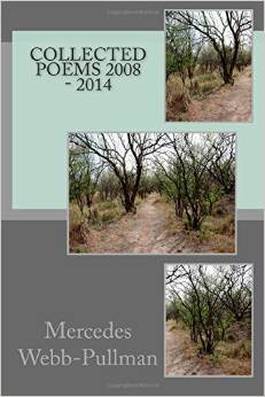
Collected Poems 2008-2014
by Mercedes Webb-Pullman
I have read many of Webb-Pullman’s poems in publications and usually find something to appreciate in all of them, and I like many in their entirety, too. So, anticipation. A good solid collection is what I expected, and that’s what I got. I expected to say, on a casual run-through, that Collected Poems 2008-2014 is a satisfying, meaty read.
The Singing Bones …We sing of tides, slow shifts that claim us…
And in many ways, it is a satisfying, meaty read. How could it be otherwise with a writer of this competence? So well-read. Such an extensive vocabulary. Her passion for detail and dissection.
That satellite as it stitches time and place together –
Will it teach drabardi how to wring water from stone?
Webb-Pullman is frank and fearless, and each poem carries its publication details like an endorsement. And yet, overall, in some strange manner, this collection lets her down. It’s like a private album, a scrapbook, where you stick everything as it comes to you – chronological order. So what gets lost is any ranking of the items; any readerly sense of relative importance. So you turn the page and there’s a silly parody of Larkin.
… you needn’t have kept the keys
to the other country.
Bridges never burn easily.
Sometimes the glass remains empty.
Lonely people don’t live longer
that’s only how it feels.
I think Webb-Pullman needed an external editor who could have assisted in finding a thematic arrangement that would have suited a better intention. Not to collate together all her poems ‘lest we forget.’ But to display a selection that would have allowed easier comparison of this and that, encourage a better appreciation of her style, her thoroughness, the deep intensity she offers that needs space to be defined.
And at these stars
darkness must stop. From this one sky
stars synthesize oceans of sound
in whose white shine the cave
slides open…
I would have liked a clustering of poems that offered contrasts throughout the entirety of what’s put together here. Perhaps I have worked with books too much. I know that content and format have to co-operate and co-exist; that overall the product has to demonstrate flow and unity. To be organic, in the sense that Coleridge intended.
The tohunga said the omens are right
the full moon of autumn reddens the beach
waves lick at the rocks. You feel the wind bite
like a taniwha.
Here, that flow and unity has been lost through the petty irritations of what hasn’t happened. Minor details that jar. For example, there’s no imprint – an ISBN, but no details on the title page reverse of who by and where published – a mandatory statement.
Then those tags of who had previously published what poem and where. Distracting. Almost they dare you not to approve of Webb-Pullman’s poems, admire her skills, the expertise of the poet. Yet for me that external endorsement is an unnecessary flourish that gets between me and the poetry. I’m being coerced into admiring Webb-Pullman’s undoubted skill at putting words together when what I wanted to do was dip and browse, read once, read twice, come up with my own evaluation and a private list of favourites.
What would I choose? I don’t know. I was unable to come to any clear-cut decision. The literary and historical references sometimes make what I am appreciating come across as a workshop exercise where technique triumphs over feeling.
Harnessing what is written to a name, an event, a style or form of expression.
The decision to put together a collection of poem might have been correct. How it was done seems, ultimately to have failed the poetry and the poet.
Images flicker into black and white
color fades, gone the scents of
horses, dogbush, dust
trailing hoofbeats, laughter, whips…
Author: Mercedes Webb-Pullman
ISBN: 9781503070578
Publisher: Bench Press
Available: Unity Books, Wellington; POD and Kindle on Amazon, http://www.amazon.com/dp/1503070573/; Bench Press www.benchpress.co.nz

 RSS Feed
RSS Feed
